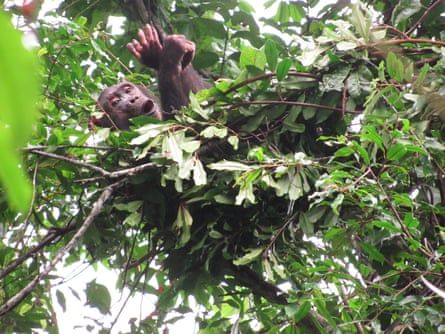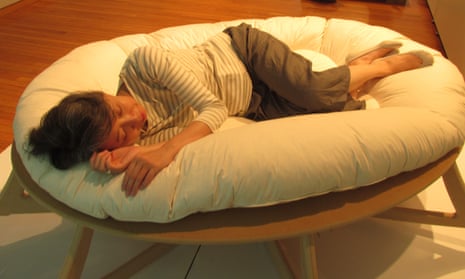After he woke feeling unusually rested and refreshed among the treetops of an east African forest, Koichiro Zamma was convinced he had ended the seemingly elusive quest for the perfect sleep.
There were no memory foam pillows or mattresses, just a simple bed of cool leaves held together by a wickerwork of twigs, and built not by humans but by chimpanzees.
Two decades on from his eureka moment, Zamma, a research fellow at the graduate school of Asian and African area studies at Kyoto University, believes chimpanzees hold the key to the ultimate comfy bed.
His “humankind evolution bed”, which is on display as part of an exhibition on sleep at Kyoto University Museum until this weekend, is deceptively simple in its design.
The mattress features a depression in the centre to replicate the natural dip in a chimp’s treetop bed and has a raised periphery for the head, legs and arms. It is supported by a frame made from woven paper string for maximum breathability, and eight curved legs that are designed to allow the bed to rock almost imperceptibly.

“Chimpanzee beds are designed to envelop the body, which is why they are so comfortable,” the 43-year-old primatologist said. “They’re also built high up in the trees, so they rock with the movement of the branches. You could say they are the prototype of a baby’s cradle.”
With the help of the Japanese designer Shinichi Ishikawa and Iwata, a Kyoto-based firm that has been making futons for almost two centuries, Zamma plans to spread the joy of proper sleep by making his beds commercially available.
At just 1.6 metres long and 1.2 metres wide, the bed sounds ill-suited to taller people, or those who fidget as they try to find the right sleeping position.
But, according to Zamma, that is not a problem encountered by chimps, who enjoy blissful, and largely motionless, sleep even with their feet sticking out.
“Just saying it is comfortable is not enough,” said Zamma, who decided to nap in a chimp’s bed in Tanzania’s Mahale mountain range during a research trip in 1999. “It removed all of the tension from my muscles in a way that ordinary beds don’t – that’s the effect of lying on something that takes into account the natural shape of the body, and it’s why chimpanzees sleep as well as they do.”

He decided to design a version for humans during a particularly hot summer in Japan several years ago. “It was so hot and humid and I was having trouble sleeping, and then I remembered how cool the chimp’s bed in Tanzania had been,” he said. He added humans’ ape-like forebears were thought to have slept in treetop beds up to 4m years ago. “In that sense, this is like sleeping in our ancestors’ beds.”
The prospect of a bed that dramatically improves the chances of getting a blissful night’s sleep should be welcomed in Japan. According to a 2013 international bedroom poll by the US-based National Sleep Foundation, two-thirds of Japanese respondents said they slept less than seven hours a night, compared with 53% of people in the US, 39% in Britain and 30% in Canada.
According to the foundation, Japanese workers sleep, on average, for six hours 22 minutes on work nights – less than their counterparts in the other surveyed countries. Not surprisingly, only 54% of Japanese respondents felt they got a good night’s sleep every or almost every night. Only 8% managed more than eight hours. British workers get only 27 minutes more, at six hours 49 minutes, but Canadians, Mexicans and Germans all regularly achieve more than seven hours sleep, according to the poll.
“It was without doubt the most comfortable bed I’ve ever slept in,” Zamma said of his nap in the Mahale treetops. “That’s what we aim to replicate with this bed – the most comfortable sleep possible.”

Comments (…)
Sign in or create your Guardian account to join the discussion